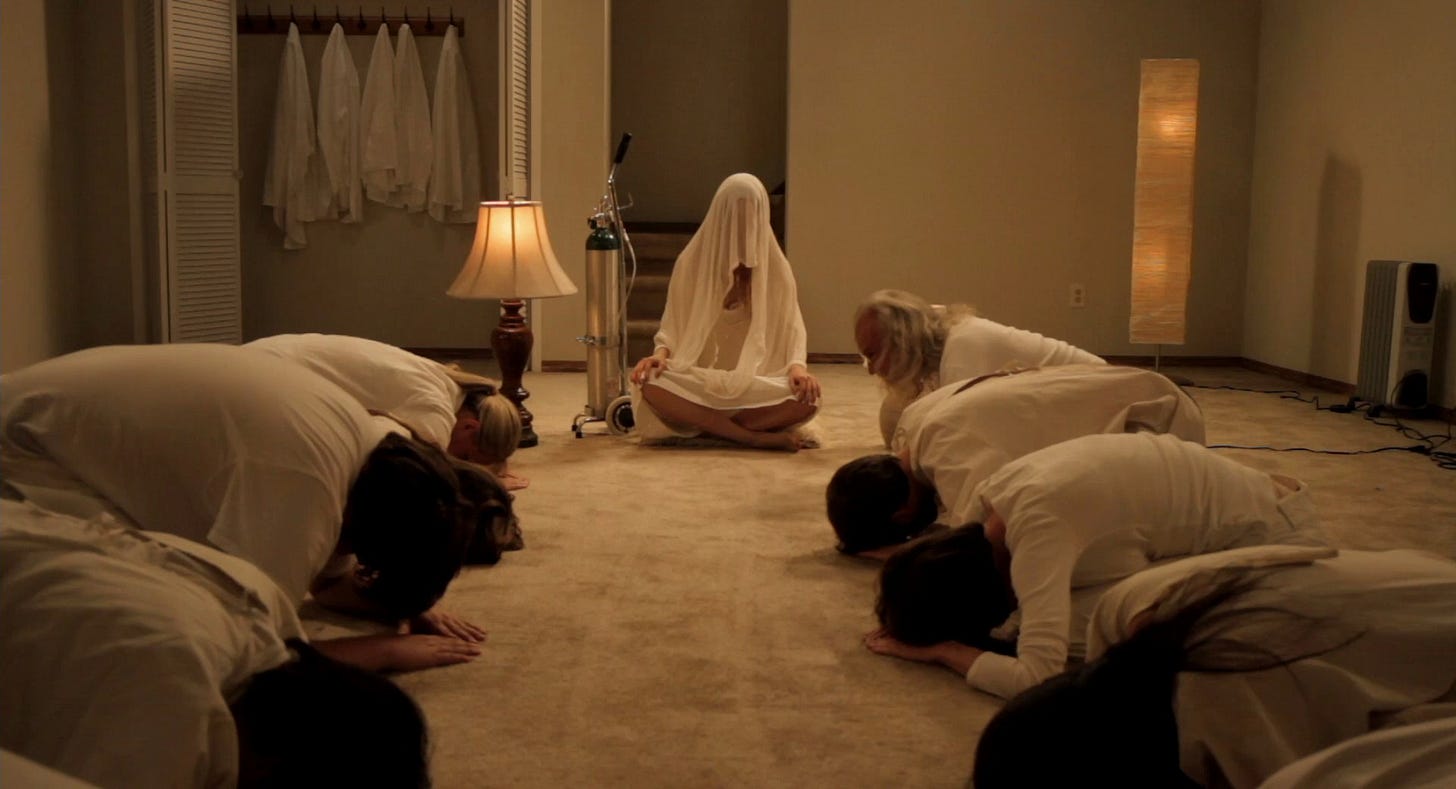
I’m not going to make a thorough argument here, just vent some of my thoughts and my frustrations with current discourse on religion, as it’s delivered from the outside. I’ve written at greater length about cults here. I will be following up soon with more detailed considerations of Love Has Won.
***
Belief, not in the sense of a supposition, but in the strong sense of an unshakable certainty, sensory plenitude, and ultimate truth the subject experiences as an exorbitant kind of more-than-life, indistinctly sensory and mental, strictly speaking ek-static [my note: i.e., out of the self].
—Julia Kristeva, This Incredible Need to Believe
***
Douglas Murray recently summarised a common cultural fascination and question: How do so many people find death cults (e.g., in the case he discusses, certain right-wing terrorist organisations) appealing?
My answer is that virtually everyone finds cults appealing. Cultists feel and thus act upon beliefs so firm that they will die and kill for them. The more unusual its ideas, the more appealing the cult is.
The belief of the cultist is not the belief of the philosopher. Their belief is what Kristeva describes in the above quote. Truth as experience. Truth as the ultimate therapeutic. Truth as the numinous and oceanic.
I hypothesise with some confidence that most people are drawn to media about cults because we are fascinated by the idea of believing in something—often, in someone—so utterly sincerely.
Absent from our public discourse is a true notion of belief as it is experienced and as it plays out. Confusion about this is only possible for an atheist.
***
Why don’t evangelical Christians just behave like liberal democrats (as in, supporters of democracy)? I see this question repeated ad nauseum. The answer is simple: Because they often sincerely believe that those who disagree with their sect of Christianity will suffer eternally.
A phrase we often hear thrown around—true believer—is superfluous. There is no believer who isn’t a true believer.
The idea that belief is a kind of add-on to life that gives universalist values and takes a backseat to liberal values is an idea only an atheist could dream up.
Saving souls, repairing the world: these are priorities that, in a compassionate believer in many of the world’s most prominent faiths, come before anything else. Isn’t a mortal lifetime of pain and destruction worth eternal bliss and the avoidance of an eternity of torture?
Atheists or “agnostics” (i.e., atheists) don’t seem to grasp that religious fanaticism is just belief.
***
BODY LIGHT UPS: Truth bumps or body chills that tell you what is truth.
—5D Full Disclosure’s Ascension Glossary
The followers and chief promoters of the Love Has Won movement often summarise how they discover truth, as in the passage above. It’s a form of intuition and sensation. And that’s what “meaning” is for most people. When we ask the nonsense question, “What is the meaning of life?” we’re asking for what gives the sensation of purposefulness, not what life means in any coherent way. Life itself isn’t a word that could have a meaning. We are asking for a purpose, and we know a valid purpose when we feel it.
Cultists have a sense of purpose. The members of Love Has Won/5D Full Disclosure famously acted according to belief against all social norms and all scepticism and mockery.
The followers of any dead messiah should be able to relate to the pleasure of following something beyond rational belief.
***
I ask what good it is to be a person who believes
'Cause all I ever wanted was to be somebody who believes
—Gore., “Doomsday”
When I hear anyone ask why people would support a horrible cult, I feel that the answer is so obvious. The more horrible the cult, the stronger the belief it takes to join, die, and kill for it. Who doesn’t want that degree of purpose?
It’s the same reason we enjoy learning about athletes, or fictional superheroes and supervillains who train hard from a young age, enduring misery as children and ever after for the sake of justice or evil.
There are certainly beneficent cults that align with liberal values. But they often devolve into liberalism over belief. It’s pretty difficult to make a liberal cult. Unless you’re Eva Frank.
Right or wrong, a universalist faith will likely not remain a faith. Liberalism, perhaps until just now, has not been a rebellious value in the west for centuries.
***
Then Hilarianus passed sentence on all of us: we were condemned to the beasts, and we returned to prison in high spirits.
—Perpetua in the Passion of Perpetua and Felicity
The weirder and riskier the cult, the better it is for our ecstasy. A cult tends to emphasise sensation over anything else, and suffering on its behalf becomes pleasant. Death becomes joyful.
A cultist loses their fear, replacing it with purpose. Who doesn’t want that?




